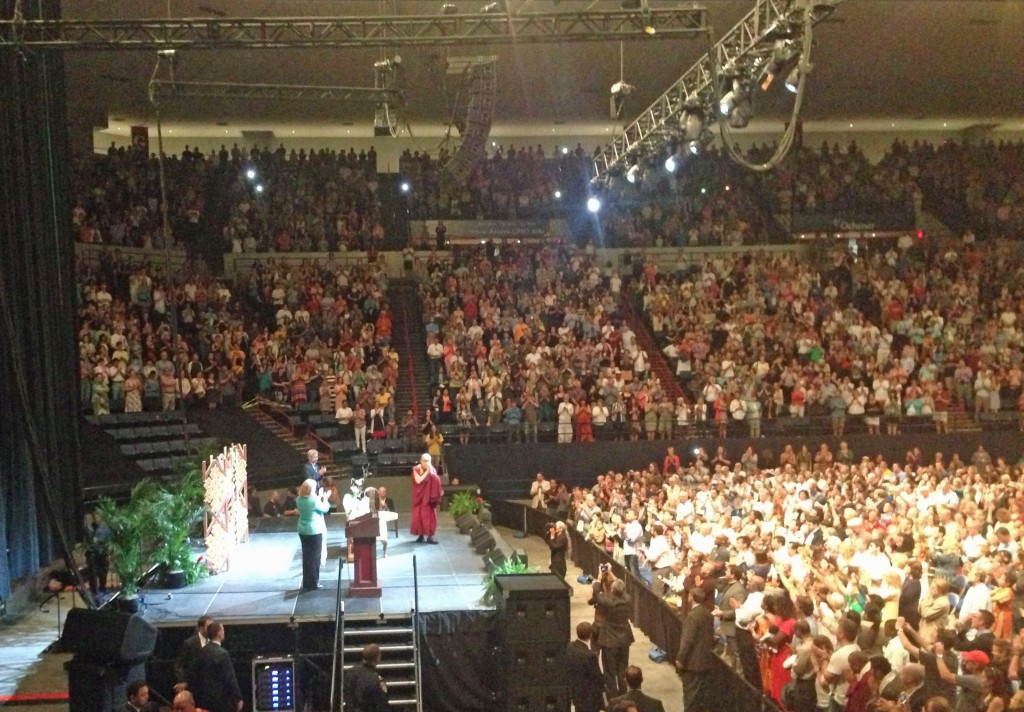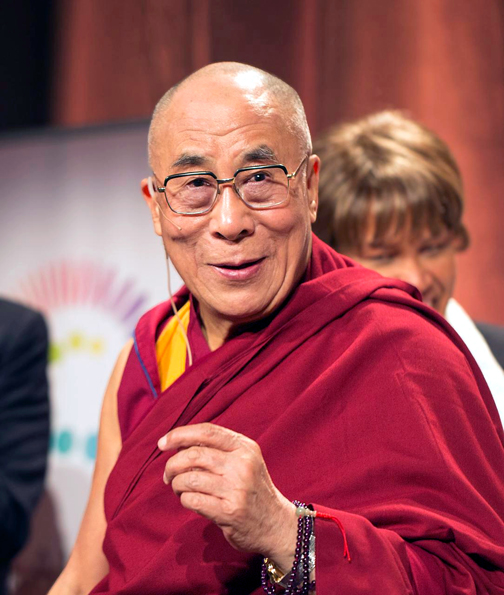
Senator Mary Landrieu introduces the Dalai Lama to a standing-room-only crowd at the Lakefront Arena Saturday.
No one missed the irony – poetic justice? divine intervention? – of the Dalai Lama’s visit to New Orleans on the heels of the Mother’s Day shooting here that wounded 19 victims. Least of all the Dalai Lama himself.
Speaking to a standing-room-only crowd at the Lakefront Arena on Saturday, the twinkly-eyed septuagenarian referred to the city’s violence – particularly gun violence – in what turned out to be a characteristically disarming way. Our problems, he admonished us gently, are our problems – he would be leaving the city on an airplane the following day. It will be up to us to make our community a safe and peaceful place.

The 14th Dalai Lama
And therein, he advised, lies our happiness. Because one’s community is also one’s family, he told us, and family determines one’s happiness.
The words reminded me of something a friend said long ago, a thought that will resonate with any parent anywhere: You are only as happy as your least happy child.
So true.
The Dalai Lama, of course, is the high lama of Tibetan Gelug monks, and the de facto leader of the Tibetan government in exile. More importantly, in the context of his speech on Saturday, he is believed to be the reincarnated spirit of a line of leaders who are metaphorically considered to be the manifestation of compassion on Earth.
Compassion proved a recurring theme for the 14th Dalai Lama, as he stood on a stage under soaring steel beams and addressed various members of the audience as though they were gathered in his own small living room.
He’s not a formal man, the Dalai Lama told us. He doesn’t stand on ceremony. He liked President Bush, the junior one, because of his friendly nature, his informality in pointing out the best cookies to eat at a White House spread. (He did not, he hastened to add, like all of his policies, such as invading Iraq.)
All of us, the Dalai Lama said, have within us the seeds for bad things: potential anger, potential violence. All of us, he continued, have within us the seeds for good things, too: for kindness, and compassion. We are different, he acknowledged, in terms of income, education, race, language. But we are alike within, where the seeds of turmoil or kindness are planted and grow.
The nurturing of those inner seeds of contempt or kindness, the Dalai Lama would have us believe, lies in community. In the acknowledgement that we are more alike than we are different, that all of us have value – equal value — and that our happiness lies in one another’s happiness.
Gun control will not come from here, he said, tapping his head, but from here, tapping his heart.
The Dalai Lama surprised me in many ways: With his keen sense of humor, his humility, and his propensity to wear various baseball caps and visors handed to him at these things (“I’m going to open a shop,” he quipped). He chatted about cataract surgery and the city’s hot climate. I wasn’t surprised to hear that he had second-lined with Dr. John and Allen Toussaint earlier that morning at the Tulane University commencement.
I didn’t hear that commencement speech. But in 2006 I heard another one, by author and political activist Elie Wiesel, that explored similar territory. “My humanity is defined by yours,” he said. It’s not enough to show tolerance for others, he advised, because that suggests condescendence. “I prefer the word respect.”
A message of compassion from one Nobel Peace Prize winner, a message of respect from another. Both were saying, essentially, the same thing: Every person has value.
And that when something happens to anyone in our community, it happens to us.
Renee Peck is editor of NolaVie. Email her at renee@nolavie.com.
 NOLAbeings Multimedia artist Claire Bangser created NOLAbeings as a portrait-based story project that marries...
NOLAbeings Multimedia artist Claire Bangser created NOLAbeings as a portrait-based story project that marries...  Voodoo in New Orleans: Reviving history: New Orleans fortune telling This article takes a deep dive into the history of Voodoo in New Orleans, its hybridization with Catholicism, and its present-day place in the city's culture. The author visits fortune-tellers in the French Quarter, using their guidance as a tool for introspection rather than a deterministic predictor of the future. Through her experiences in New Orleans, the author feels a mystical connection to both the past and the future.
Voodoo in New Orleans: Reviving history: New Orleans fortune telling This article takes a deep dive into the history of Voodoo in New Orleans, its hybridization with Catholicism, and its present-day place in the city's culture. The author visits fortune-tellers in the French Quarter, using their guidance as a tool for introspection rather than a deterministic predictor of the future. Through her experiences in New Orleans, the author feels a mystical connection to both the past and the future. 